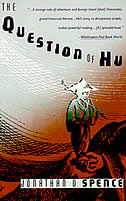The blurb on the front of this book, a quote from a review in the the Washington Post Book World, reads:
… A strange tale of adventure and foreign travel [that] illuminates grand historical themes… Hu’s story, so deceptively simple, makes powerful reading… [A] splendid book.”
That’s about as apt a soundbyte as possible. What I found the book to be is a wonderful cross-cultural examination of ideas I first encountered in Foucault’s: the way that illness as a social object is constructed, that madness is construed by things like inconvenient uncontrollability, and so on — Spence makes no reference to Foucault but there is, for me, an intersection there, beneath the surface somewhere. To find this kind of potential intersection in the work of the very distinguished Yale Sinologist/historian Jonathan Spence has been a great surprise to me, and also a pleasure.
 The tale told, specifically, is one of a Chinese Catholic named John Hu, taken into service by a Jesuit priest by the name of Foucquet, was brought from Canton to France with vague promises of going to Rome to meet the pope. Hu is by no means a scholar, but is a passable copyist, yet he does none of the work he agreed to do in his contract. Through much of his journey to France, and much of his early stay in France, he behaved in ways that seemed, to Foucquet and others, not just annoying and perplexing, but downright mad. So it is that a Chinese man, acting with the best devotion he could to his beliefs — beliefs taken at least in their origin from the European form of mainstream Catholicism of the early 1700s — ended up locked in a madhouse for three years without release.
The tale told, specifically, is one of a Chinese Catholic named John Hu, taken into service by a Jesuit priest by the name of Foucquet, was brought from Canton to France with vague promises of going to Rome to meet the pope. Hu is by no means a scholar, but is a passable copyist, yet he does none of the work he agreed to do in his contract. Through much of his journey to France, and much of his early stay in France, he behaved in ways that seemed, to Foucquet and others, not just annoying and perplexing, but downright mad. So it is that a Chinese man, acting with the best devotion he could to his beliefs — beliefs taken at least in their origin from the European form of mainstream Catholicism of the early 1700s — ended up locked in a madhouse for three years without release.
It’s a short read, partly because it’s short but also because Spence’s masterful writing style propels the reader toward the end. The way he handles history, using the perfect quotations and excerpts from letters and descriptions by eyewitnesses, and yet manages to tell the story novelistically as well, is astonishing and certainly the result not only of long practice but also a kind of talent. Spence brings to the story, as to every bit of history he relates to us, a stunning attention for detail and a penetrating eye.
And for me, there is an especial interest in those of Spence’s books which, like this one and God’s Chinese Son (his book on the Taiping Rebellion) in that he very intelligently explores the intersection of Western and Chinese culture, at that point where, when they meet, they birth strangenesses, literally pregnant misconceptions and misunderstandings (willful or otherwise). The creativity inherent in such encounters reminds me of the notion by the biologist Dawkins that the change of ideas is really the simple mutation of imperfect self-replicating structures called memes, as the basic units of idea-or thought-systems if on conceives of them as self-replicating through transmission from one mind to another. The chasms between deeply foreign cultures give those memes strange wings and they cannot arrive on the far side of the chasm in any form comparable to how they started out. This would be especially true in the premodern world, when cultures really did exist in some form of isolation from one another, as Hu’s and Foucquet’s until recently had done.
In any case, though it’s short, it’s definitely one of the most thought-provoking books I’ve read in the last Lunar New Year.